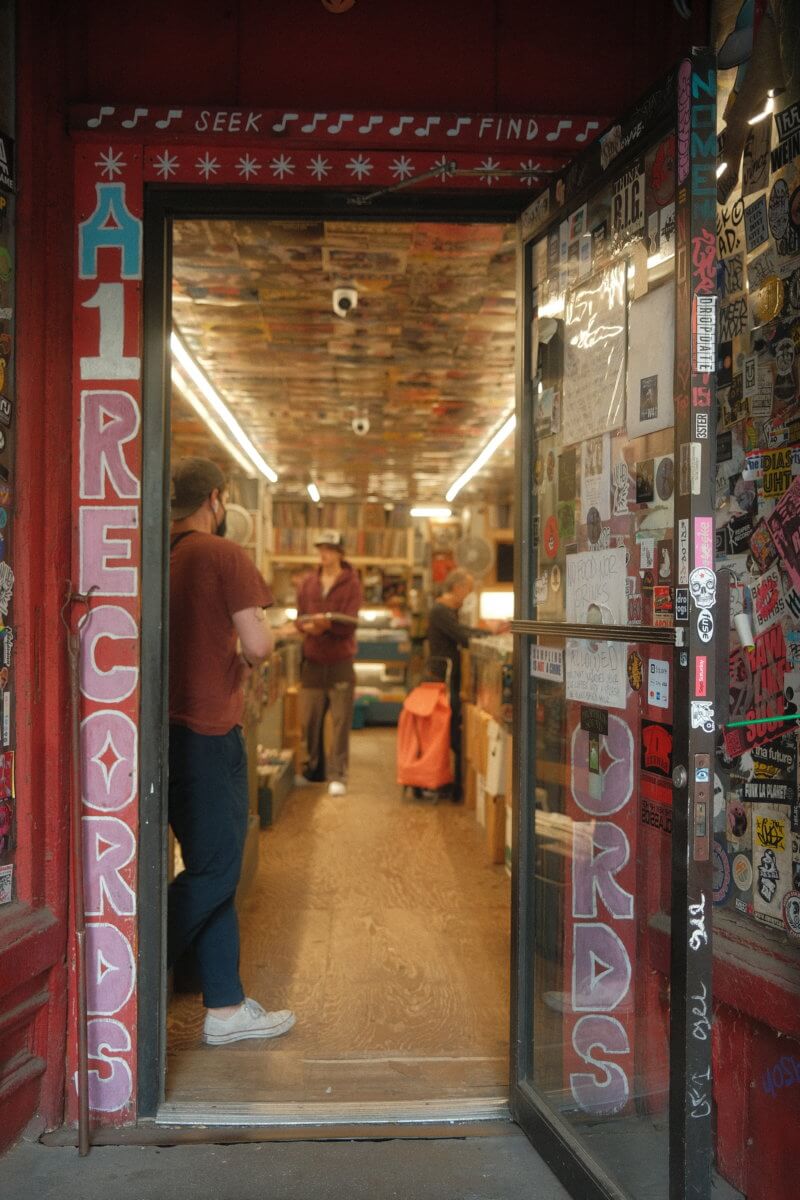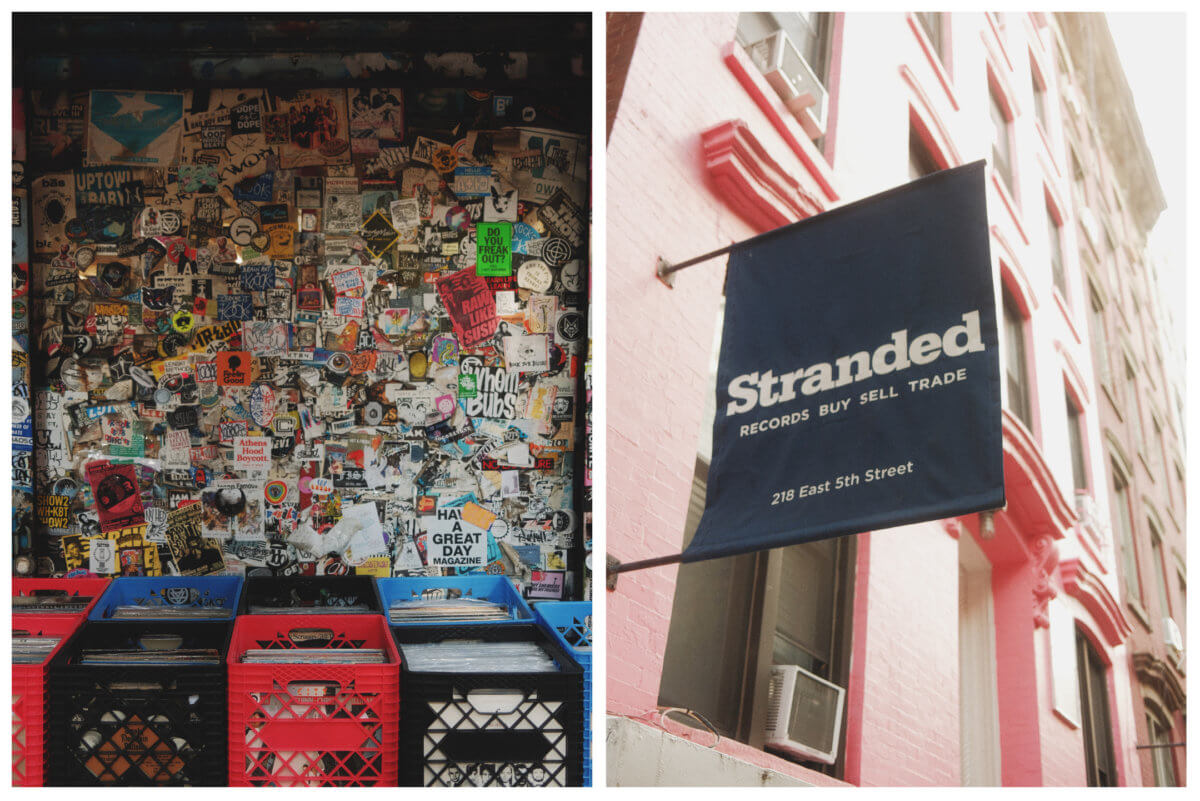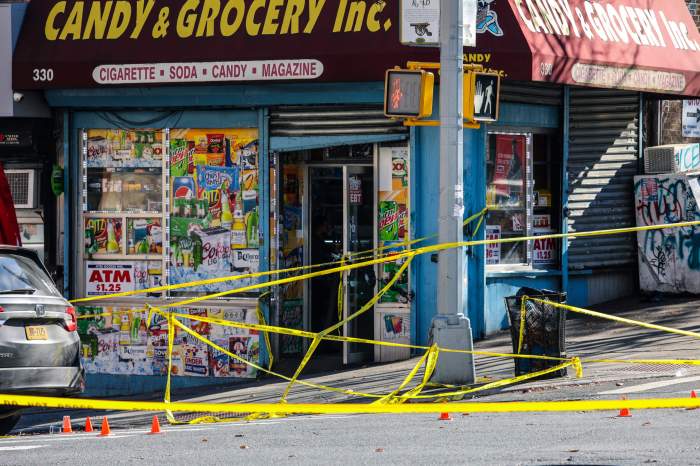“I put something on the vinyl and it’s a totally different relationship to it,” says Kamaal Ibn John Fareed.
Fareed, famously known as Q-Tip, is one of the most influential hip-hop figures of all time. From co-founding one of rap’s most progressive groups, A Tribe Called Quest, to sustaining a prosperous solo career, Q-Tip’s success in music has transcended multiple eras.
The 52-year-old rap legend, who grew up listening to vinyl, entered A1 Record Shop in the East Village neighborhood of New York City with a kind of jubilant energy that electrified an otherwise rainy Thursday evening. From the looks of it, he seemed at home in a space he knows all too well, among a niche and growing community of record collectors — or “cratediggers” as they’re often referred to.
Cratediggers come in a variety of forms including, but not limited to: lifelong collectors, millennials merely looking to use records as decor, sample-based producers looking for sounds to rip, and flat-out music junkies in love with music in its purest medium. Wherever a cratedigger falls on the spectrum, they typically share one common interest: the desire for a physical experience that consuming music digitally can’t produce.
Asked about how new-age streaming stacks up to old-school vinyl, Q-Tip said, “just the physicality of being able to put a needle on a record. When you hear those pops from it being worn, skips, all that sh-t … it’s just something to it.”
No comparison to digital
In an era dominated by digital media and technology, some artists and aficionados say listeners have lost a bit of touch with emotionally-invoking experiences. It’s that very void record collectors across the board seek to fulfill.
Among them is Simon Aksenfeld, a Ukrainian-born, Brooklyn-bred clerk who began working at A1 Record Shop two years ago.
“There’s no emotional connection to a digital file for me,” Aksenfeld said. “When you come inside a record shop, it’s a lot more than just spending money on a record, you’re a part of something [bigger].”
Given the recent trends in music consumption, it seems that many consumers are after this emotional connection.

While streaming remains the most popular, convenient, and cheapest way for music to be consumed, the resurgence of vinyl has been a noteworthy trend in the music industry during the past few years. Last October, the New York Times reported that, for the first time in 30 years, vinyl records claimed the top spot as the most popular and highest-grossing physical format of music.
Experts say there are a handful of reasons that explain the switch.
“People feel alienated by streaming and crave a more intimate tactile experience,” said Ardian Rew, who opened Ergot Records in New York City a little over a year ago. The small shop, located on Second Street in the East Village, sells a variety of genres of records and cassettes — both new and used.
The sound of sentimentality
Intimacy. Experience. Relationship. Connectivity. Quality. Single New Yorkers aren’t the only ones seeking these things — so are cratediggers and vinyl enthusiasts.
Christopher Caba is a 22-year-old visual artist with over 300 records who describes himself as “a little more old school.” He bought his first record — Good Kid, m.A.A.d City by Kendrick Lamar — in 2018, and has been in love with record shopping ever since. Still, it wouldn’t make much sense if he didn’t stream music, having been raised during the apex of digital media.
“If a new album comes out, I’m streaming it,” he said. But his preference for music consumption differs from what his age would suggest. And it all comes back to experiencing music tangibly. “Anything that’s more hands-on, you just feel it more.”
Caba currently lives in Tampa Bay, Florida with his grandfather, who was born and raised in the Bronx. He says his favorite record one by Duke Ellington that brought him and his grandfather even closer.
When he bought it, Caba says his grandfather’s reaction was: ‘I love Duke Ellington… play it, play it!’”
“We sat down and listened to the record and he was just telling me all about that time,” he said, stressing that there are just some experiences with physical records that the digital format can never produce.
Not trading one medium for another
Along with the sentimental experiences, some vinyl enthusiasts allude to autonomy as a pleasant aspect of record shopping and playing. Any given record collection consists of a personally-curated assortment of vinyl records intentionally picked. Not suggestions based on popularity.
Spotify, Apple Music, and Tidal, like most DSPs, are driven by algorithms. They force-feed music to consumers, based on which labels, artists, and music executives are most popular or paying for placements.
Record store owner Rew says that he feels that he’s in charge of choosing what he listens to when playing records. He says, “there’s no external force controlling the music.”
Aksenfeld from A1 Record Shop expresses similar feelings: “You get to talk to people in the store that are avid listeners of all different kinds of music. It’s a lot more exciting to find out about music in that way, as opposed to some algorithm telling me ‘oh, you’re gonna like this.’”
The resurgence of vinyl hasn’t resulted in a diminishing of DSPs. It probably won’t, either. Present-day mass media is predicated on accessibility and perpetuates the lessening of human attention span over time. Digital media is more practical to consume. Subscribers of any of the popular DSPs have access to an unlimited music library.

For music consumers across the board, it’s hard to beat that. Especially, as technology continues advancing at the mind-blowing rate we’ve observed over the past few decades. Streaming services are much less expensive than record collecting.
DSPs typically have a flat monthly fee ranging from $4.99 to $20. Some platforms offer student and family discounts, too. Record prices, on the other hand, vary immensely. Some cost less than $1, while some rarities such as Elvis Presley’s My Happiness can reach upwards of $100,000.
It’s also expensive to make vinyl, which is why many new artists and record labels don’t consistently produce them.
At the same time, many signs point to the revival of physical record sales as more than just a trend. Asked about the sustainability of the current craze surrounding vinyl, Rew says, “Old, good records will always have a market.”
Anthony Allman, the manager of Stranded Records, on 5th Street, near NYU has been collecting records since he was 6 years old. He says, “People are obsessive about it because it’s fun. Keep it fun.”
































